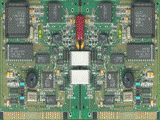Electrical and Computer Engineering, Department of

Department of Electrical and Computer Engineering: Faculty Publications (to 2015)
Document Type
Article
Date of this Version
1-2011
Citation
IEEE JOURNAL ON SELECTED AREAS IN COMMUNICATIONS, VOL. 29, NO. 1, JANUARY 2011; Digital Object Identifier 10.1109/JSAC.2011.110108
Abstract
Explosive growth in Information Technology has enabled many innovative application areas such as large-scale outdoor vehicular networks for vehicle-to-vehicle communications. By providing time-sensitive and location-aware information, vehicular networks can contribute to a safer and more efficient driving experience. However, the performance of vehicular networks requires robust and real-time data communications and is impacted by high mobility, intermittent connectivity, and unreliability of the wireless channel. In this paper, a novel adaptive distributed cooperative medium access control (ADCMAC) protocol is proposed in order to address the inherent problems in the IEEE 802.11 standard when employed in vehicular networks. ADC-MAC exploits spatial diversities to maximize the system throughput as well as the service range of vehicular networks. This is accomplished through adaptively selecting the most suitable helper and transmission mode for transmit/receive pairs among direct transmission (DT), cooperative relay (CR) transmission and two-hop relay (TR) transmission, in accordance with the channel quality and the positioning of relay nodes. Both our Markov Chain modeling based theoretical analysis and ns-2 simulation experiments show that our ADC-MAC protocol outperforms existing schemes under the same network scenarios and maximizes the achieved system throughput and service distance.


Comments
Copyright 2011 IEEE